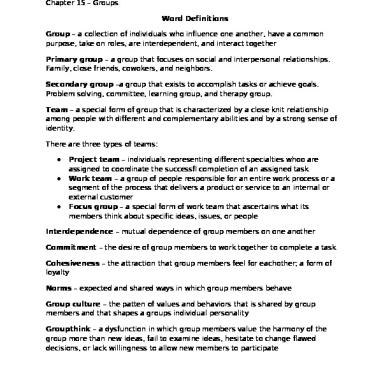Communications Test Review Chapter 15
This document was uploaded by user and they confirmed that they have the permission to share it. If you are author or own the copyright of this book, please report to us by using this DMCA report form. Report DMCA
Overview
Download & View Communications Test Review Chapter 15 as PDF for free.
More details
- Words: 285
- Pages: 1
Communications Test Review Chapter 15 – Groups Word Definitions Group – a collection of individuals who influence one another, have a common purpose, take on roles, are interdependent, and interact together Primary group – a group that focuses on social and interpersonal relationships. Family, close friends, cowokers, and neighbors. Secondary group –a group that exists to accomplish tasks or achieve goals. Problem solving, committee, learning group, and therapy group. Team – a special form of group that is characterized by a close knit relationship among people with different and complementary abilities and by a strong sense of identity. There are three types of teams: • •
•
Project team – individuals representing different specialties whoo are assigned to coordinate the successfl completion of an assigned task Work team – a group of people responsible for an entire work process or a segment of the process that delivers a product or service to an internal or external customer Focus group – a special form of work team that ascertains what its members think about specific ideas, issues, or people
Interdependence – mutual dependence of group members on one another Commitment – the desire of group members to work together to complete a task Cohesiveness – the attraction that group members feel for eachother; a form of loyalty Norms – expected and shared ways in which group members behave Group culture – the patten of values and behaviors that is shared by group members and that shapes a groups individual personality Groupthink – a dysfunction in which group members value the harmony of the group more than new ideas, fail to examine ideas, hesitate to change flawed decisions, or lack willingness to allow new members to participate
•
Project team – individuals representing different specialties whoo are assigned to coordinate the successfl completion of an assigned task Work team – a group of people responsible for an entire work process or a segment of the process that delivers a product or service to an internal or external customer Focus group – a special form of work team that ascertains what its members think about specific ideas, issues, or people
Interdependence – mutual dependence of group members on one another Commitment – the desire of group members to work together to complete a task Cohesiveness – the attraction that group members feel for eachother; a form of loyalty Norms – expected and shared ways in which group members behave Group culture – the patten of values and behaviors that is shared by group members and that shapes a groups individual personality Groupthink – a dysfunction in which group members value the harmony of the group more than new ideas, fail to examine ideas, hesitate to change flawed decisions, or lack willingness to allow new members to participate
Related Documents

Communications Test Review Chapter 15
June 2020 6
Chapter 15 Test Review
June 2020 6
Communications Test Review Chapter 2
June 2020 5
Communications Test Review Chapter 6
June 2020 5
Communications Test Review Chapter 3
June 2020 3